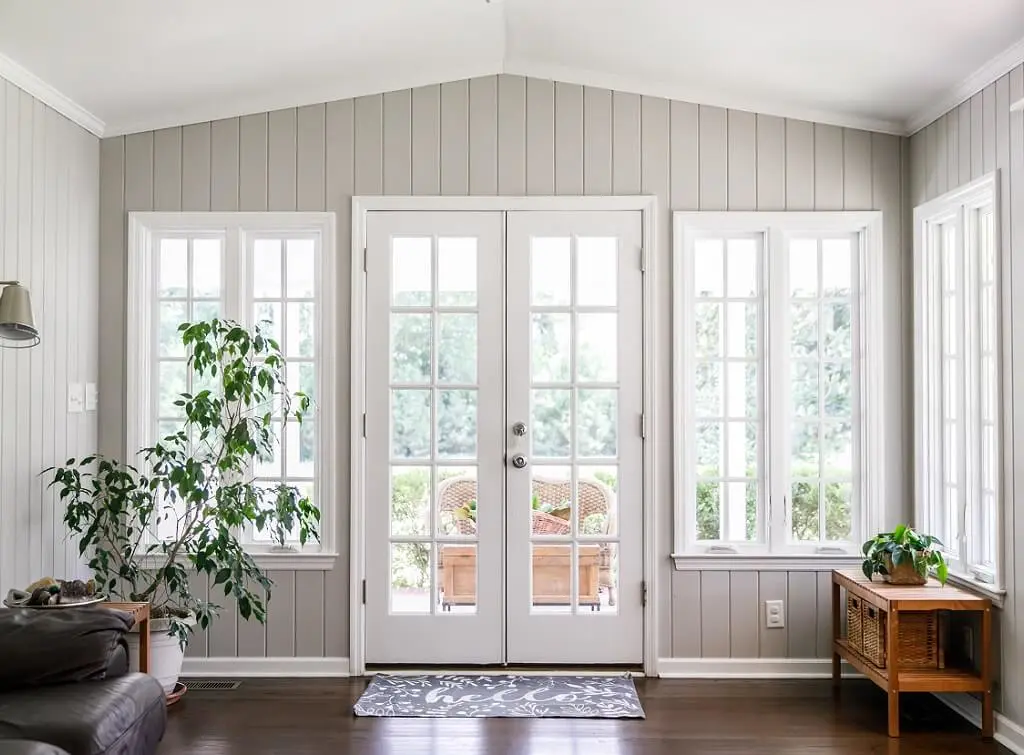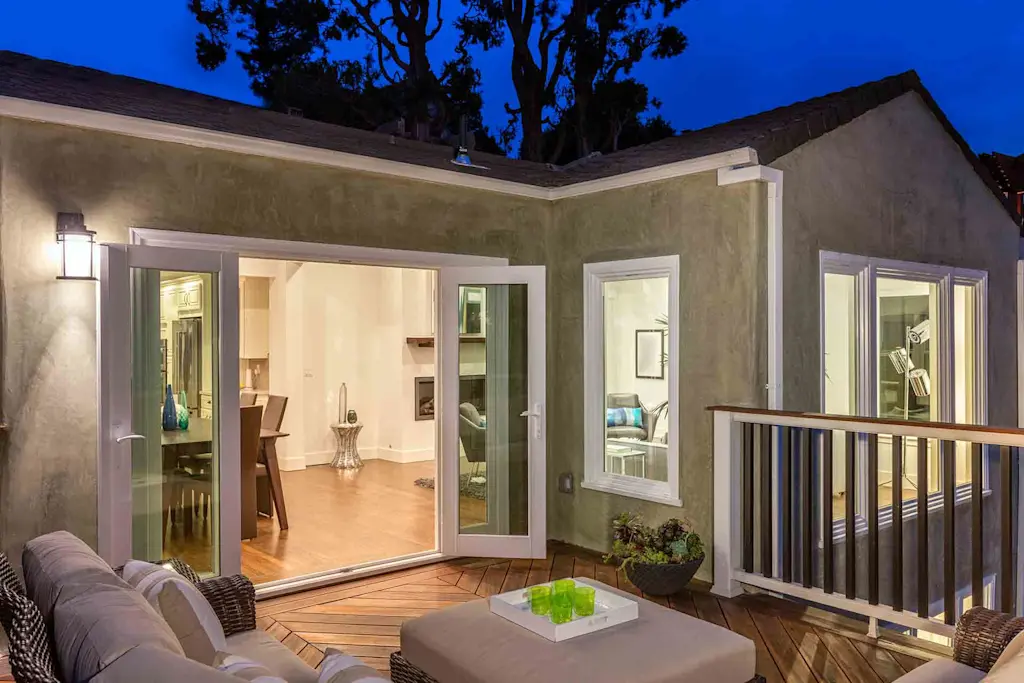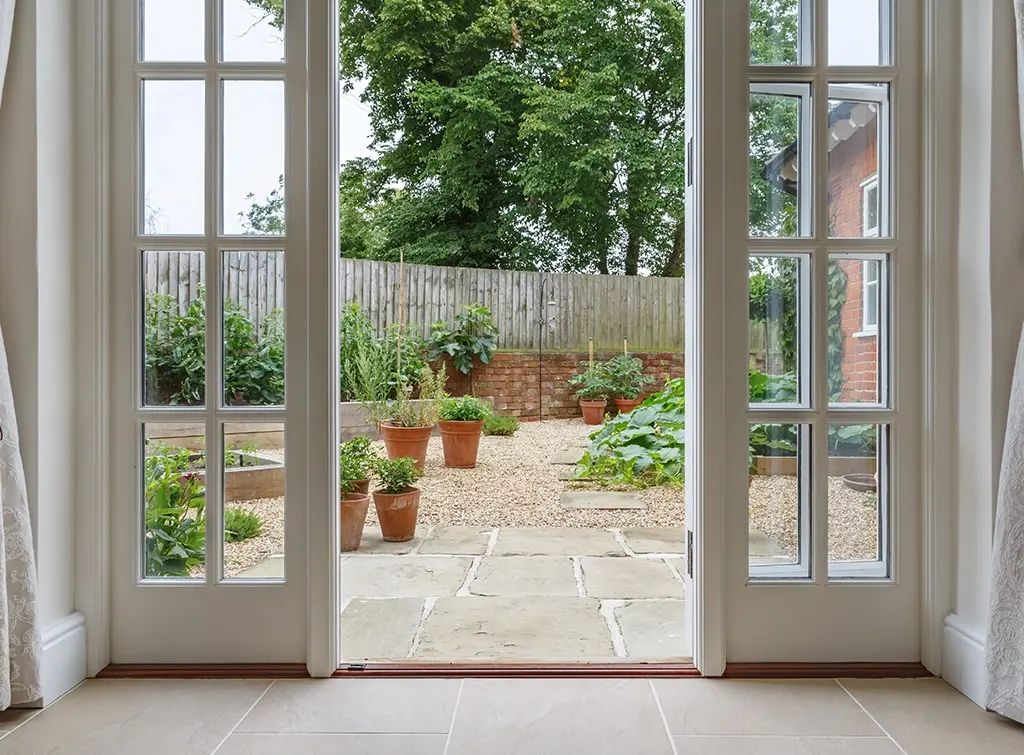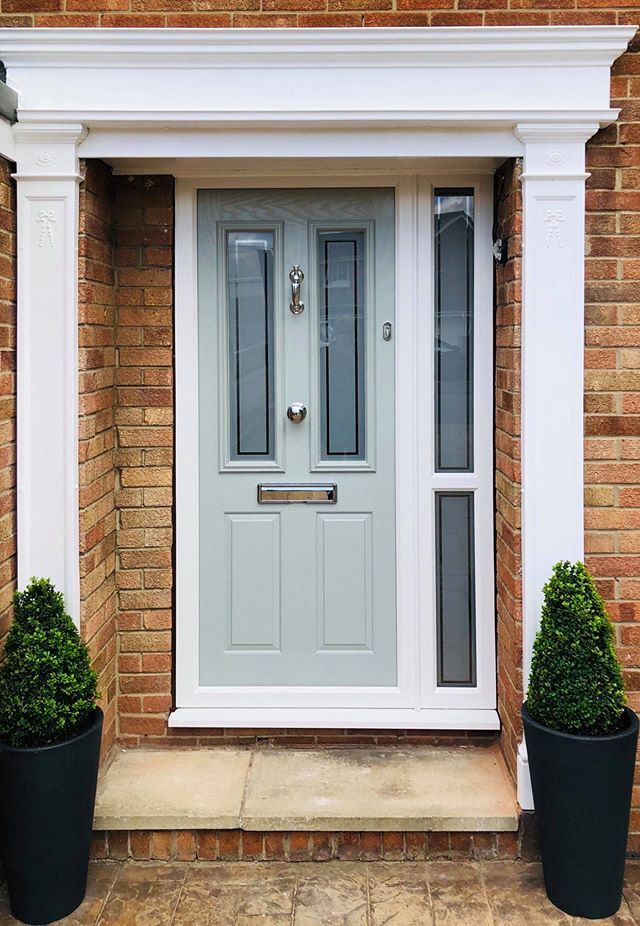Blog>Expert Advice>Buying guide: Helping you to choose your composite French doors
Last updated: 18 September 2024
Buying guide: Helping you to choose your composite French doors
We overview what to look for when buying composite French doors, including key features, costs, and popular brands.

Composite French doors are elegant and timeless, adding charm and sophistication to any style of property.
In this buying guide, we share what to look for when buying composite French doors, helping you to make your selection with confidence.
What is a composite French door?
Composite doors combine multiple materials, such as wood, uPVC fibreglass (GRP), and high-density foam to create a strong and durable door that offers top-quality insulation.
French doors, also known as 'window doors' were originally used in French architecture as oversized windows. They are characterised by their glazed panels (either single or multi panel), which run the full height of the door.
Why choose a composite French door?
Composite French doors are popular with homeowners looking for a classic style of entryway that allows plenty of natural light into their home.
They're not only an attractive and charming style of door, but they help to bring the outside in, perfectly framing views of the garden, and providing a good source of ventilation.
There are several reasons why homeowners choose composite French doors, including:
Aesthetics: French doors are available in various styles and colours, making it easy to complement the look of your home
Design: Composite French doors are solid, robust, and durable and available in various widths, making them ideal for narrow openings
Style: They are hugely versatile, with traditional multi-pane designs or more contemporary single pane options
Practicality: The vast glazing creates a light-filled room during the day, reducing the need for artificial lighting; their double opening allows for good ventilation on warmer days
Energy efficiency: Composite doors offer excellent insulation, which can help to lower your energy bills
Durability: The multi-layer construction of composite doors means they'll never expand or shrink - they can last around 30 years or more
Low maintenance: Composite doors don't need to be painted or varnished as wooden doors do; they just need a wipe-over every now and again and a yearly oil of the hinges
Security: Composite French doors are highly secure, with advanced multipoint locking systems and toughened glass to deter intruders
See the tradespeople we've checked and recommend for your job
How to choose the best composite French doors
You've probably considered other types of rear or patio doors for your home, so let's explore the benefits of French doors in more detail. Here's what to look for when buying composite French doors.
Quality and security
Composite French door designs are built to last and are incredibly durable. With high-protection grade glass and reinforced frames, a quality product that's professionally installed and well-maintained could last 30 years or more.
We always recommend selecting a door that comes with a guarantee - around 10 years is fairly standard.
Some homeowners worry about the security of French doors, given the amount of glazing. However, this shouldn't be a concern.
Exterior French doors are specially engineered with security as a top priority, incorporating a highly-secure, integrated locking system.
Look for doors that meet UK safety standards, such as PAS024, which tests the door's resistance to forced entry
Talk to your supplier about the suitability of various lock systems, including multipoint locks, full hinge systems, and bolts that attach to the bottom of the doorframe
Many external French doors are equipped with two sets of lock – one of them a morticed deadlock
Contact or pay a trade through Checkatrade and you’re covered by our 12-month guarantee of up to £1,000*

Energy efficiency and thermal performance
Energy efficiency and thermal performance are key considerations for doors and windows nowadays, with regulations in place to make sure standards are met.
Composite French doors perform particularly well in this area due to their multi-layer construction. This helps to prevent heat loss, which in turn, can reduce your energy bills.
By law, all replacement windows and doors in the UK must have a U-value of 1.4W/m²K or less.
Check your doors have been tested for their energy efficiency and thermal performance
Ask your supplier about triple-glazed 'A-rated' glass or look into S-Glaze technology - for security and thermal performance
Check your installer is FENSA-registered and registered under the Competent Person Scheme - this means they can self-certify their work meets building regulations
Style and design
Originally, French doors were made of wood, but nowadays, their frames can be uPVC, aluminium, or composite.
And within those varieties, there's a wide selection of designs and styles available, making them suitable for all types of property.
Multi-pane French doors have several panels of glass within each door leaf and look great on a traditional-style home
Single-pane French doors lend themselves to a more contemporary style
French doors are ideal for smaller openings. It's even possible to get Ultra Slim narrow French doors. However, if space isn't an issue, consider incorporating glazed side panels (sidelights) for an abundance of natural light.
The size of French doors can vary depending on the manufacturer, but as a guide:
External French doors range in height from approx. 4ft up to as high as 10ft, but the standard size is 6ft high x 6ft wide
French doors with sidelights (glass side panels) can be as wide as 9.84ft
Cost and installation
Whatever style of door you're considering, whether a standard rear door or a composite French door, the cost is an important factor.
The supply and installation of composite French doors averages around £2,300
However, the cost of the door itself can vary depending on the quality of the product, its design, security features, and energy efficiency. In fact, a composite double door can range in price from £1,500 - £5,000 - just for the door, not including installation.
The cost of installing French doors will also depend on several factors. This includes whether you're:
Replacing like-for-like
Converting an existing window to French doors
Creating a new opening for French doors
Enlarging an existing window/door to then fit French doors
Labour costs will vary across the UK, and you can expect to pay more if you're creating a new opening or enlarging an existing one. Find out more in our door installation cost guide.

Request a quote for your composite French door installation
It's always best to get a selection of quotes from composite door suppliers (and installers, if this is separate). This allows you to compare quotes side-by-side, meaning:
You can check what's included across multiple quotes, e.g. making good any areas disturbed during installation and waste disposal
You can assess whether all the key features you requested are included, e.g. additional locks or A-rated glazing
You can secure a fair and competitive price for the work
Always check out customer reviews too, and ask to see previous examples of an installer's work.
Check your installer has the relevant qualifications or accreditations, such as the Competent Persons Scheme, FENSA, or CERTASS.
See the tradespeople we've checked and recommend for your job
What are the most popular composite French door brands?
Doors are the entryways to our homes. Choosing reputable brands that offer solid, safe, and secure products is key.
To help kick-start your research, we've outlined some of the most popular brands offering composite French doors in the UK:
Apeer - known for style and exceptional craftsmanship
Comp Door - known for great thermal efficiency and security
Endurance - known for sustainably, safety, and energy efficiency
Rockdoor - a best-selling brand with innovative S-Glaze technology
Solidor - a brand known for excellent security
Virtuoso - precision engineering and unrivalled quality

On Checkatrade, you'll only find trades who meet our high standards and pass up to 12 checks.
Interested in composite doors for the rest of your home?
A new set of composite French doors will make a stunning addition to your home, but have you considered how they'll look alongside your current rear, side, or front door?
A smart exterior is known to add value to a home, so upgrading all your external doors could be a wise investment.
Buying guide: Helping you to choose your composite doors
Our composite doors buying guide gives you all the information you need to help make the right choice for your home.
Key takeaways
Composite French doors are a traditional style of door that help to bring plenty of natural light into a property
They are highly durable and low-maintenance, with superior energy-efficiency
Security, energy efficiency, and design are some of the top considerations homeowners make when choosing a composite stable door
Always hire an experienced installer to fit your composite door
On average, composite French doors cost around £2,300 for supply and installation

Find an expert in composite French doors near me
All Checkatrade tradespeople must pass up to 12 checks and meet our high standards to be a member.
Plus, when you book your composite French door installer with us, we'll guarantee their work up to £1,000. Guaranteed for 12 months – Eligibility and T&Cs apply.
See the tradespeople we've checked and recommend for your job
FAQs
Are composite French doors secure?
Yes, quality composite French doors prioritise security, often featuring multipoint locking systems and toughened glass, making them highly resistant to forced entry.
Are composite French doors energy-efficient?
Composite doors are one of the most energy-efficient types of door due to their multi-layer construction - composite French doors are no different.
What is the lifespan of composite French doors?
A good quality composite French door that's professionally installed and well-maintained can last up to 30 years or more.
Do composite French doors require a lot of maintenance?
Maintenance for composite doors is minimal — just a quick wipe down with soapy water and an annual oiling of the hinges is all that's typically needed.
Do I need planning permission for composite French doors?
In most cases, planning permission is not needed if replacing French doors, like-for-like. However, all installations must meet building regulations.
See the tradespeople we've checked and recommend for your job



